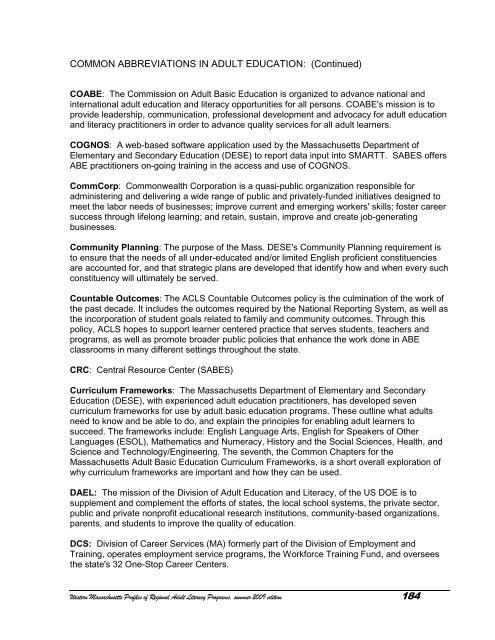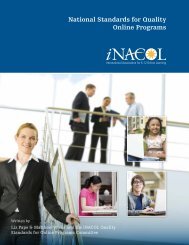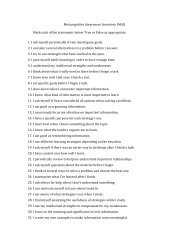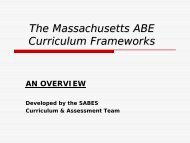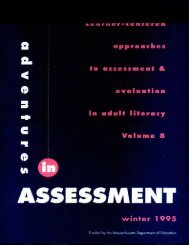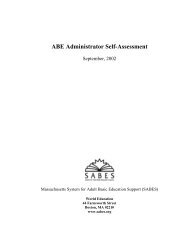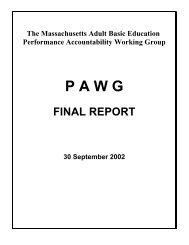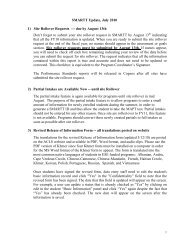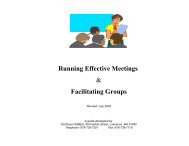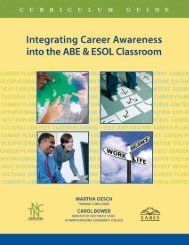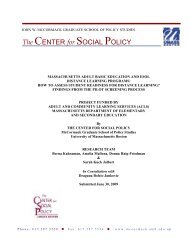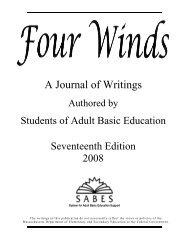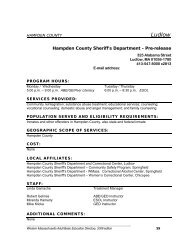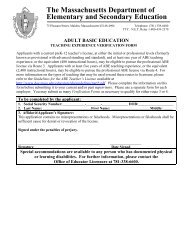SECTION 1: THE SYSTEM FOR ADULT BASIC ... - SABES
SECTION 1: THE SYSTEM FOR ADULT BASIC ... - SABES
SECTION 1: THE SYSTEM FOR ADULT BASIC ... - SABES
Create successful ePaper yourself
Turn your PDF publications into a flip-book with our unique Google optimized e-Paper software.
COMMON ABBREVIATIONS IN <strong>ADULT</strong> EDUCATION: (Continued)<br />
COABE: The Commission on Adult Basic Education is organized to advance national and<br />
international adult education and literacy opportunities for all persons. COABE's mission is to<br />
provide leadership, communication, professional development and advocacy for adult education<br />
and literacy practitioners in order to advance quality services for all adult learners.<br />
COGNOS: A web-based software application used by the Massachusetts Department of<br />
Elementary and Secondary Education (DESE) to report data input into SMARTT. <strong>SABES</strong> offers<br />
ABE practitioners on-going training in the access and use of COGNOS.<br />
CommCorp: Commonwealth Corporation is a quasi-public organization responsible for<br />
administering and delivering a wide range of public and privately-funded initiatives designed to<br />
meet the labor needs of businesses; improve current and emerging workers' skills; foster career<br />
success through lifelong learning; and retain, sustain, improve and create job-generating<br />
businesses.<br />
Community Planning: The purpose of the Mass. DESE's Community Planning requirement is<br />
to ensure that the needs of all under-educated and/or limited English proficient constituencies<br />
are accounted for, and that strategic plans are developed that identify how and when every such<br />
constituency will ultimately be served.<br />
Countable Outcomes: The ACLS Countable Outcomes policy is the culmination of the work of<br />
the past decade. It includes the outcomes required by the National Reporting System, as well as<br />
the incorporation of student goals related to family and community outcomes. Through this<br />
policy, ACLS hopes to support learner centered practice that serves students, teachers and<br />
programs, as well as promote broader public policies that enhance the work done in ABE<br />
classrooms in many different settings throughout the state.<br />
CRC: Central Resource Center (<strong>SABES</strong>)<br />
Curriculum Frameworks: The Massachusetts Department of Elementary and Secondary<br />
Education (DESE), with experienced adult education practitioners, has developed seven<br />
curriculum frameworks for use by adult basic education programs. These outline what adults<br />
need to know and be able to do, and explain the principles for enabling adult learners to<br />
succeed. The frameworks include: English Language Arts, English for Speakers of Other<br />
Languages (ESOL), Mathematics and Numeracy, History and the Social Sciences, Health, and<br />
Science and Technology/Engineering. The seventh, the Common Chapters for the<br />
Massachusetts Adult Basic Education Curriculum Frameworks, is a short overall exploration of<br />
why curriculum frameworks are important and how they can be used.<br />
DAEL: The mission of the Division of Adult Education and Literacy, of the US DOE is to<br />
supplement and complement the efforts of states, the local school systems, the private sector,<br />
public and private nonprofit educational research institutions, community-based organizations,<br />
parents, and students to improve the quality of education.<br />
DCS: Division of Career Services (MA) formerly part of the Division of Employment and<br />
Training, operates employment service programs, the Workforce Training Fund, and oversees<br />
the state's 32 One-Stop Career Centers.<br />
Western Massachusetts Profiles of Regional Adult Literacy Programs, summer 2009 edition 184


